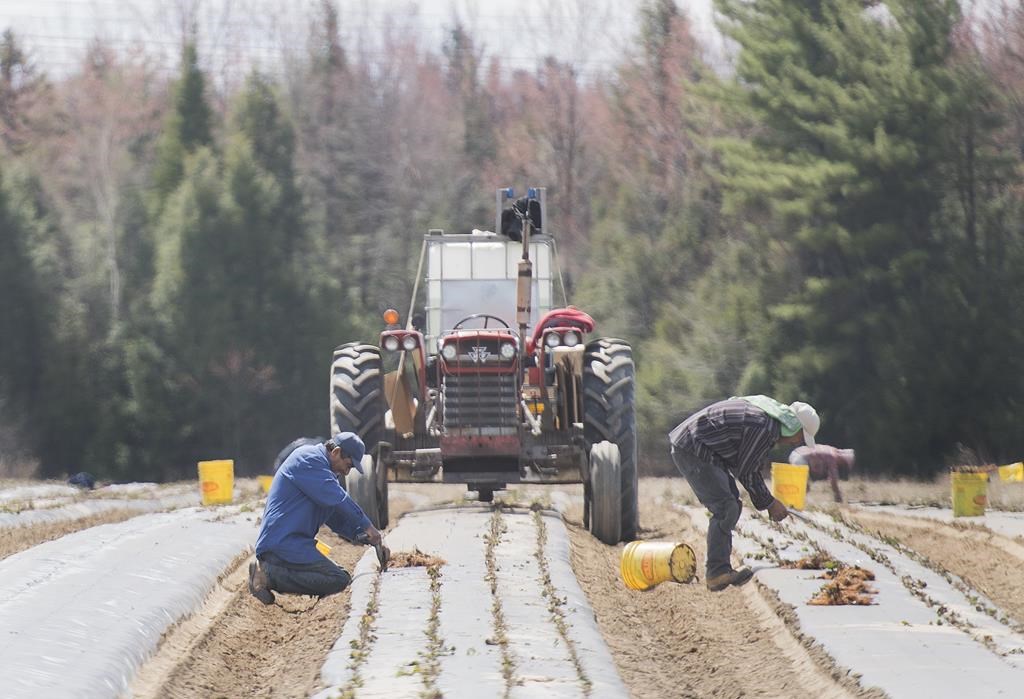A new report looking at the impact the pandemic had on the exploitation of migrant workers in Canada is raising concerns about an increase in labour trafficking.

The groups involved in the report say a major labour shortage, coupled with the status of temporary foreign workers, is leading to more situations of migrant workers being taken advantage of.
The report, “It Happens Here: Labour Exploitation Among Migrant Workers During the Pandemic,” is a joint project by the Canadian Centre to End Human Trafficking, FCJ Refugee Centre and Legal Assistance Windsor.
The report is the result of several focus groups held in Toronto, London, Leamington and the Greater Toronto and Hamilton areas in 2022, with 77 migrant workers from across different sectors in Ontario sharing their pandemic experiences.
“If you understand it as a spectrum of exploitation and discrimination, labour trafficking is considered legally to be the very far and most extreme end of exploitation, but it often doesn’t happen overnight, and so we really like to think about this as prevention and be an early exit,” said Julia Drydyk, executive director of the Canadian Centre to End Human Trafficking.
“We look at the entire continuum of exploitation, and hopefully, that means that someone who is a migrant worker can access support before it gets to that very extreme level.”
Drydyk told Global News this report is the second time they spoke to migrant workers about their experiences in Canada, which allowed them to compare conditions before the COVID-19 pandemic and after its peak.
She said the current information about labour trafficking is “just the tip of the iceberg.”
“I think it’s far more prevalent, and part of it is because people don’t know what labour trafficking is. They don’t know to look for the signs.”
An estimated 777,000 labourers arrived in Canada in 2021, 39 per cent of whom were employed in the agricultural, manufacturing, construction and food processing sectors.
The agencies found five key issues among workers — the first, a limited understanding of their rights and the second, that almost half did not know labour trafficking was an issue in Canada.
The third concern that migrant workers raised was frustration with policies that make it difficult to become a permanent resident in Canada.
“Both by employers and by illegal recruiters, migrant workers are told that there are pathways to permanent residency or citizenship when in reality, that is not the case. There are no pathways, pathways for temporary foreign workers to obtain any form of permanent residency or citizenship in Canada,” Drydyk said.
“That hope of somehow, at some point, if you work hard enough for five or 10 years, you might have a chance to be able to settle in Canada and maybe bring your family. That’s also being used to coerce them into these horrible labour standards.”

The report showed that migrants’ chief concern was being separated from their families, making them less likely to talk about pay discrepancies, inadequate housing or harassment.
Loly Rico, executive director of the refugee centre, told Global News when workers who speak out about their rights reported threats, they would be replaced and blacklisted from other jobs in their sector.
“The working conditions are like slavery because you have control of the worker because the work permit is on their name specifically in which company,” Rico said.
With this in mind, she said it can be challenging for workers to advocate for themselves when they notice issues in pay or are not being compensated for the hours they work. Rico said workers have also talked about having their paycheques docked for housing and food to the point where there is almost nothing left.
- Posters promoting ‘Steal From Loblaws Day’ are circulating. How did we get here?
- Video shows Ontario police sharing Trudeau’s location with protester, investigation launched
- Canadian food banks are on the brink: ‘This is not a sustainable situation’
- Solar eclipse eye damage: More than 160 cases reported in Ontario, Quebec
The report also found that while COVID-19 vaccines as made available to migrant workers, only one-third had equitable access to health care due to their location and status and that some employers failed to provide living conditions where workers could properly social distance.
During the pandemic, multiple COVID-19 outbreaks were reported among migrant workers in the agricultural sector.
“We know that migrant workers have experienced exploitation and often deal with incredibly cramped, unsuitable housing conditions. So when you lay a pandemic on top of that, it’s really just a powder keg for sickness and then also for other areas of exploitation,” Drydyk said.
With job vacancies reaching 5.7 per cent in mid-2022, the federal government changed the Temporary Foreign Worker Program, allowing businesses across seven sectors to increase the percentage of migrant labour in their workforce.
But organizations who worked on the report worry that without changes, this will also lead to an increase in exploitation and labour trafficking.
Drydyk said those who come to Canada on Temporary Foreign Worker Permits have their status in the country linked to one employer, which puts them in a difficult position to leave and find a better job because they are at risk of losing their status to work in Canada.
“They’re coming into Canada, being tied to a specific employer, meaning unless they access the right legal remedies, which are actually very hard to access, they’re actually at greater risk of retribution, violence or discrimination from employers.”
The report calls on the federal government to institute open work permits for all migrant workers, allowing them more flexibility.
“This means that if they have unsuitable living conditions, if they’re not treated well, if they don’t get the hours, the pay, and the conditions they were promised upon entry, like any other Canadian resident, they would be able to shift employers.”
Agencies involved in the report are also calling on the federal and provincial governments to invest money in making it easier for migrant workers to be aware of their rights in Canada and help them know how to access the services available to them, like health care and legal support.
The Canadian Centre to End Human Trafficking said 55 per cent of Canadians either don’t believe or don’t know that it is a major issue in Canada.
The groups also wanted to see Canada’s immigration legislation updated to provide pathways to citizenship for low-wage immigrant workers in all sectors and make it easier for migrant workers to bring their families.
“Migrant workers are essential to the Canadian economy. For us to be able to buy local and sustain our agricultural industry in Canada, we need migrant workers because they are here to do work that Canadians simply are not willing to do,” Drydyk said.
“Protecting them from being exploited in our communities should be a top priority for all of us. Our future food security in Canada rests on the backs of migrant workers.”





Comments